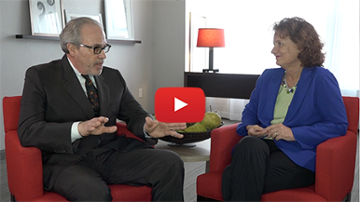When asked why they waited so long to intervene with a physician who exhibited behaviors that were ranged from disruptive, dangerous or self-destructive to passive aggressive, unproductive or depressed, many organizations confess to being afraid that a top performer might quit if he or she were held accountable for or asked to change those behaviors.
 It’s important for physicians to not just be quality clinicians but also to be effective leaders, communicators and team players. Physicians who aren’t able to keep up with workflow and administrative duties such as charting, can have a negative impact on:
It’s important for physicians to not just be quality clinicians but also to be effective leaders, communicators and team players. Physicians who aren’t able to keep up with workflow and administrative duties such as charting, can have a negative impact on:
- Patient safety
- Productivity
- Efficiencies
- Staff retention
- Staff focus and concentration
“Taking a ‘wait-and-see’ approach and hoping that the physician will self-correct is almost the industry paradigm,” says Liz Ferron, senior consultant for VITAL WorkLife . “Most organizations resist doing their first intervention. Yet, once they see the results that are possible, the bar for referable behavior typically gets much lower and physicians are referred not only more often, but much sooner.”
Not Just for Disruptive Behavior Anymore
While disruptive behavior and poor anger management continue to top the list of behaviors for which physicians are referred, Ferron says VITAL WorkLife is seeing an increasing number of referrals for issues related to practice management and/or depression such as:
- Physicians who are consistently behind in their charting, either due to inability to master EMR or other underlying issues
- Physicians who are unable to manage the same case load as their peers
- Physicians who seem to be struggling with stress or depression—typically ones who are exhibiting a markedly different affect than before
While practice management issues don’t usually increase the risk of lawsuits, staff turnover and patient satisfaction to the same extent that disruptive behaviors do, they certainly do have an impact on a healthcare organization’s bottom line. A physician showing signs of depression, stress or burnout today can easily become tomorrow’s disruptive doctor.
“Physician often suffer in silence prior to demonstrating negative behaviors at work,” says Ferron.
“The current healthcare environment is both challenging and stressful—physicians need and deserve resources to assist them with leadership, teamwork and stress management.”
- Stress and burnout
- Lack of cultural fit
- Ineffective coping strategies
- Lack of awareness of their impact on others, or difficulty reading the social cues of others
- Low frustration tolerance
- Difficulty with managing conflict
- Behavioral, neurological, cognitive or personality disorders
- Excessive workload
- Unhealthy lifestyle
Why should healthcare administrators devote time to their well-paid physician employees’ emotional health and happiness?
- A 2007 review of the research and literature relating to physician job satisfaction and its effect on patient satisfaction found “overwhelmingly” that experiencing and expressing positive emotions and moods not only tended to enhance performance at individual, group and organizational levels—but also showed a positive relationship between physician job satisfaction and patient satisfaction as well as health outcomes.1
- A 2009 study confirmed that high levels of Emotional Intelligence (EI) in physicians was significantly associated with less burnout, higher job satisfaction and higher patient satisfaction.2
- Physicians who are more competent in recognizing emotions, concerns and needs of patients (physicians with high Emotional Intelligence) are more successful in treating them.
There are four components to emotional intelligence—the abilities to perceive, use, understand and manage emotions. While physicians are trained in medical school to understand every aspect of the human body, they are actively discouraged from spending too much time thinking about their emotions or work/life balance.
“As a result of their training and the demands of their careers, many physicians have become disconnected from their emotions as a way to cope with the challenge and trauma in their professions,” explains Ferron. “Sometimes these emotions build up and lead to explosive outbursts, or become stunted and lead to depression.”
VITAL WorkLife works with healthcare organizations to consider the best strategy for intervening with physician behavioral or productivity issues and providing whatever level or support or intervention is required or desired.
Physician peer coaching often plays an important role in helping physicians turn around unproductive behavior. Showing them how other doctors have overcome the same challenges provides the proof of efficacy many physicians need before committing to a course of action. “They’re busy people, so they’re not going to waste time on something that doesn’t have proven benefits,” says Ferron.
With extensive experience working with medical professionals and a host of interventions undertaken with VITAL WorkLife, Ferron says the most surprising lesson learned is how grateful most doctors are for the help they receive as a result of the intervention.
“They may be defensive and guarded initially about having been referred to our program, but most end up feeling glad to have had the opportunity to find more constructive and productive ways of dealing with their stress and frustration,” concludes Ferron. “They soon realize we’re not here to beat them up—but to help them be successful. It’s an investment their organization has made in their future.”
We Can Help
Contact us to learn more about our Physician Intervention solution and how it can help your physicians and providers, ultimately increasing the overall well being of your healthcare organization.
SOURCES:
1 Barsade SG, Gibson DE: Why does affect matter in organizations? Academy of Management Perspectives 2007, 21:36-59.
2 Weng, H.-C., Hung, C.-M., Liu, Y.-T., Cheng, Y.-J., Yen, C.-Y., Chang, C.-C. and Huang, C.-K. (2011), Associations between emotional intelligence and doctor burnout, job satisfaction and patient satisfaction. Medical Education, 45: 835—842. doi: 10.1111/j.1365-2923.2011.03985.x



